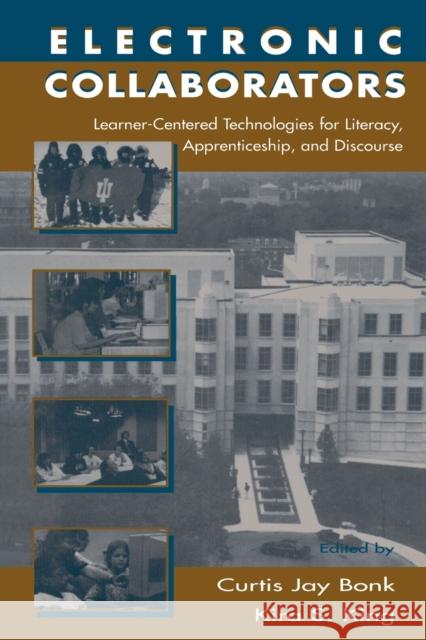Electronic Collaborators: Learner-centered Technologies for Literacy, Apprenticeship, and Discourse » książka



Electronic Collaborators: Learner-centered Technologies for Literacy, Apprenticeship, and Discourse
ISBN-13: 9780805827972 / Angielski / Miękka / 1998 / 432 str.
Electronic Collaborators: Learner-centered Technologies for Literacy, Apprenticeship, and Discourse
ISBN-13: 9780805827972 / Angielski / Miękka / 1998 / 432 str.
(netto: 255,46 VAT: 5%)
Najniższa cena z 30 dni: 184,03
ok. 16-18 dni roboczych.
Darmowa dostawa!
This state-of-the-art volume details the tools for computer conferencing and collaboration, the learning theories grounding their use, and the preliminary results of this merging of theory building with tool use. br
"Evolving collaborative strategies demand our understanding; this early research provides us with some frameworks for doing just that. Recommended for upper-division undergraduates and above."
—CHOICE
"...this book offers a valuable treatise for those who are interested in finding out more about CMC and CSCL and their uses for promoting new approaches to collaborative learning processes."
—Educational Technology Review
"In summary, Electronic Collaborators is a very valuable contribution to the debate around the 'new educational paradigm' which is claimed for online collaborative learning. Even more, it is itself an excellent example of collaboration between teaching and research within a small group of institutions. It is thus highly relevant to the graduate study arena for which it is intended."
—Computers & Education
"This is an exceptional educational book, for it deals with its subject matter--electronic learner-centeredness--in great depth and detail, and yet remains consistently readable from start to finish. It is a treasure for readers, for it offers a rich and comprehensive resource in respect of four distinct aspects of the use of IT in higher education today, and especially tomorrow....If you have come to see that the most valuable learning nowadays is no longer an isolated and individual activity, but occurs in social interaction with fellow students, authorities, and mentors, you will want to explore the development of socio-cultural theory with these writers, and you will delight in the new perspectives which that will open up for you, whatever your starting point....Buy it; don't expect to read it--completely--for a long time; be prepared to return to it again and again, and constantly to find new thoughts and suggestions which you will value, and put to good use."
—British Journal of Educational Technology
"This volume addresses a research-oriented readership, but will be of interest to educational technologists who want to move design beyond the presentation of material, towards creating contexts for active participation and learning."
—Education, Communication & Information
"The authors collectively argue that the effective use of technology to support learning must be predicated on a soundly designed instructional effort....[they] present a comprehensive theoretical framework for selecting technologies such as e-mail, the Internet, and the World Wide Web (WWW), multimedia, and databases for use in teaching and learning....Theoretical foundations are well documented, and chapters are complete with examples, transcripts, screen-shots, tables of data, and visual models."
—The Journal of Higher Education
"Electronic Collaborators is a welcome addition to any 21st century educator's personal library. Its best quality is its strong pedagogical and research foundation which enables it to withstand the tremors and fissures of rapid technological change.Electronic Collaborators merges theory and practice, weaving the two into a harmonious set of best practices and lessons learned."
—TESL-EJ
"Appropriate and timely....Provides a coherent formulation of the relationship between computer collaboration and social constructivism....This is a strong volume that will add to Erlbaum's impressive list in educational technology."
—Jay David Bolter
Georgia Institute of Technology
"A wonderful new entry to the history of the electronic classroom. It will be useful to educators at every level as they probe the possible....This book's strength is the way in which it addresses a variety of models for electronic collaboration, then has the principals of the projects comment on the pedagogy involved....The variety of settings and objectives offers lots to think about and the effort to ground each model in current pedagogy is excellent....The wealth of pedagogical strands that are brought together is inspiring and serves as a jumping off point for the next generation of learner-centered technology."
—David Tillyer
The City University of New York
Contents: M. Riel, Foreword: Conceptual Order and Collaborative Tools--Creating Intellectual Identity. Preface. C.J. Bonk, K.S. King, Introduction to Electronic Collaborators. Part I:Theoretical and Technological Foundations. C.J. Bonk, K.S. King, Computer Conferencing and Collaborative Writing Tools: Starting a Dialogue About Student Dialogue. C.J. Bonk, D.J. Cunningham, Searching for Learner-Centered, Constructivist, and Sociocultural Components of Collaborative Educational Learning Tools. T.M. Duffy, B. Dueber, C.L. Hawley, Critical Thinking in a Distributed Environment: A Pedagogical Base for the Design of Conferencing Systems. Part II:Stand-Alone System Collaboration. C. Angeli, D.J. Cunningham, Bubble Dialogue: Tools for Supporting Literacy and Mind. J.R. Savery, Fostering Ownership for Learning With Computer-Supported Collaborative Writing in an Undergraduate Business Communication Course. Part III:Asynchronous Electronic Conferencing. W.A. Sugar, C.J. Bonk, Student Role Play in the World Forum: Analyses of an Arctic Adventure Learning Apprenticeship. S-M. Chong, Models of Asynchronous Computer Conferencing for Collaborative Learning in Large College Classes. R. Althauser, J.M. Matuga, On the Pedagogy of Electronic Instruction. S.E. Kirkley, J.R. Savery, M.M. Grabner-Hagen, Electronic Teaching: Extending Classroom Dialogue and Assistance Through E-mail Communication. E. Zhu, Learning and Mentoring: Electronic Discussion in a Distance Learning Course. Part IV:Multiconferencing: Asynchronous and Synchronous Classrooms. D.H. Cooney, Sharing Aspects Within Aspects: Real-Time Collaboration in the High School English Classroom. C.J. Bonk, E.J. Hansen, M.M. Garbner-Hagen, S.A. Lazar, C. Mirabelli, Time to "Connect": Synchronous and Asynchronous Case-Based Dialogue Among Preservice Teachers. I. King, The Use of Computer-Mediated Communication: Electronic Collaboration and Interactivity. Part V:Looking Back and Glancing Ahead. M.A. Siegel, S.E. Kirkley, Adventure Learning as a Vision of the Digital Learning Environment. K.S. King, Designing 21st-Century Educational Networlds: Structuring Electronic Social Spaces.
Curtis Jay Bonk, Kira S. King
1997-2026 DolnySlask.com Agencja Internetowa
KrainaKsiazek.PL - Księgarnia Internetowa









